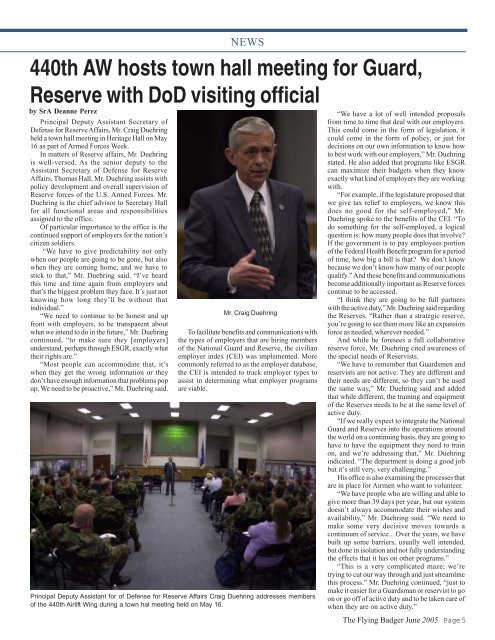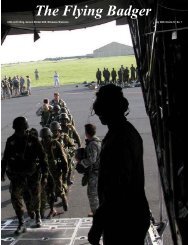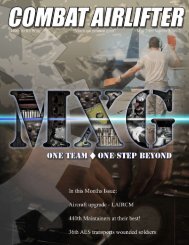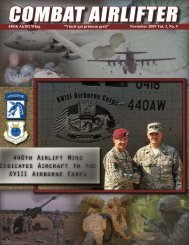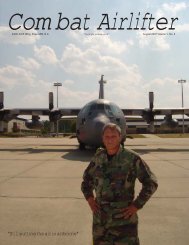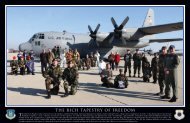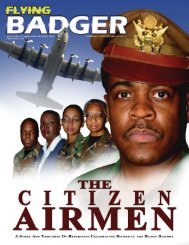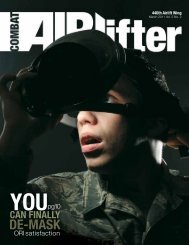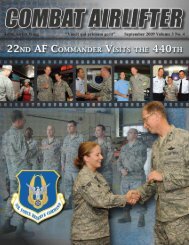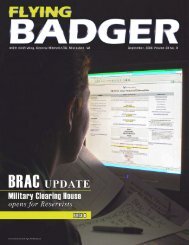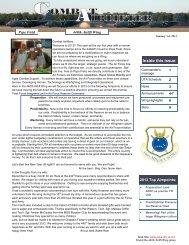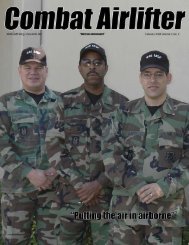June 05.pmd - 440th Airlift Wing
June 05.pmd - 440th Airlift Wing
June 05.pmd - 440th Airlift Wing
- No tags were found...
You also want an ePaper? Increase the reach of your titles
YUMPU automatically turns print PDFs into web optimized ePapers that Google loves.
Principal Deputy Assistant Secretary ofDefense for Reserve Affairs, Mr. Craig Duehringheld a town hall meeting in Heritage Hall on May16 as part of Armed Forces Week.In matters of Reserve affairs, Mr. Duehringis well-versed. As the senior deputy to theAssistant Secretary of Defense for ReserveAffairs, Thomas Hall, Mr. Duehring assists withpolicy development and overall supervision ofReserve forces of the U.S. Armed Forces. Mr.Duehring is the chief advisor to Secretary Hallfor all functional areas and responsibilitiesassigned to the office.Of particular importance to the office is thecontinued support of employers for the nation’scitizen soldiers.“We have to give predictability not onlywhen our people are going to be gone, but alsowhen they are coming home, and we have tostick to that,” Mr. Duehring said. “I’ve heardthis time and time again from employers andthat’s the biggest problem they face. It’s just notknowing how long they’ll be without thatindividual.”“We need to continue to be honest and upfront with employers, to be transparent aboutwhat we intend to do in the future,” Mr. Duehringcontinued, “to make sure they [employers]understand, perhaps through ESGR, exactly whattheir rights are.”“Most people can accommodate that, it’swhen they get the wrong information or theydon’t have enough information that problems popup. We need to be proactive,” Mr. Duehring said.NEWS<strong>440th</strong> AW hosts town hall meeting for Guard,Reserve with DoD visiting officialby SrA Deanne PerezMr. Craig DuehringTo facilitate benefits and communications withthe types of employers that are hiring membersof the National Guard and Reserve, the civilianemployer index (CEI) was implemented. Morecommonly referred to as the employer database,the CEI is intended to track employer types toassist in determining what employer programsare viable.Principal Deputy Assistant for of Defense for Reserve Affairs Craig Duehring addresses membersof the <strong>440th</strong> <strong>Airlift</strong> <strong>Wing</strong> during a town hal meeting held on May 16.“We have a lot of well intended proposalsfrom time to time that deal with our employers.This could come in the form of legislation, itcould come in the form of policy, or just fordecisions on our own information to know howto best work with our employers,” Mr. Duehringstated. He also added that programs like ESGRcan maximize their budgets when they knowexactly what kind of employers they are workingwith.“For example, if the legislature proposed thatwe give tax relief to employers, we know thisdoes no good for the self-employed,” Mr.Duehring spoke to the benefits of the CEI. “Todo something for the self-employed, a logicalquestion is: how many people does that involve?If the government is to pay employees portionof the Federal Health Benefit program for a periodof time, how big a bill is that? We don’t knowbecause we don’t know how many of our peoplequalify.” And these benefits and communicationsbecome additionally important as Reserve forcescontinue to be accessed.“I think they are going to be full partnerswith the active duty,” Mr. Duehring said regardingthe Reserves. “Rather than a strategic reserve,you’re going to see them more like an expansionforce as needed, wherever needed.”And while he foresees a full collaborativereserve force, Mr. Duehring cited awareness ofthe special needs of Reservists.“We have to remember that Guardsmen andreservists are not active. They are different andtheir needs are different, so they can’t be usedthe same way,” Mr. Duehring said and addedthat while different, the training and equipmentof the Reserves needs to be at the same level ofactive duty.“If we really expect to integrate the NationalGuard and Reserves into the operations aroundthe world on a continuing basis, they are going tohave to have the equipment they need to trainon, and we’re addressing that,” Mr. Duehringindicated. “The department is doing a good jobbut it’s still very, very challenging.”His office is also examining the processes thatare in place for Airmen who want to volunteer.“We have people who are willing and able togive more than 39 days per year, but our systemdoesn’t always accommodate their wishes andavailability,” Mr. Duehring said. “We need tomake some very decisive moves towards acontinuum of service... Over the years, we havebuilt up some barriers, usually well intended,but done in isolation and not fully understandingthe effects that it has on other programs.”“This is a very complicated maze; we’retrying to cut our way through and just streamlinethis process.” Mr. Duehring continued, “just tomake it easier for a Guardsman or reservist to goon or go off of active duty and to be taken care ofwhen they are on active duty.”The Flying Badger <strong>June</strong> 2005 Page 5


